Exploring Ethical Issues in Research: Junk Food and Childhood Obesity
VerifiedAdded on 2023/04/24
|10
|2622
|129
Essay
AI Summary
This essay provides an in-depth analysis of ethical considerations in research, specifically focusing on two research papers addressing the impact of junk food on childhood obesity. It identifies and analyzes the ethical concerns researchers face during planning, conducting, and presenting their research, emphasizing the importance of honesty, objectivity, integrity, and respect for human subjects. The essay discusses key ethical considerations such as harm and risk factors, informed consent, privacy, and confidentiality, highlighting potential consequences of neglecting these principles. Furthermore, it reflects on personal experiences with unethical leadership and suggests measures to address such issues, concluding with the importance of adhering to ethical norms to promote research integrity and public trust. Desklib offers a platform to access this and similar assignments, providing students with valuable study resources and AI-based tools.
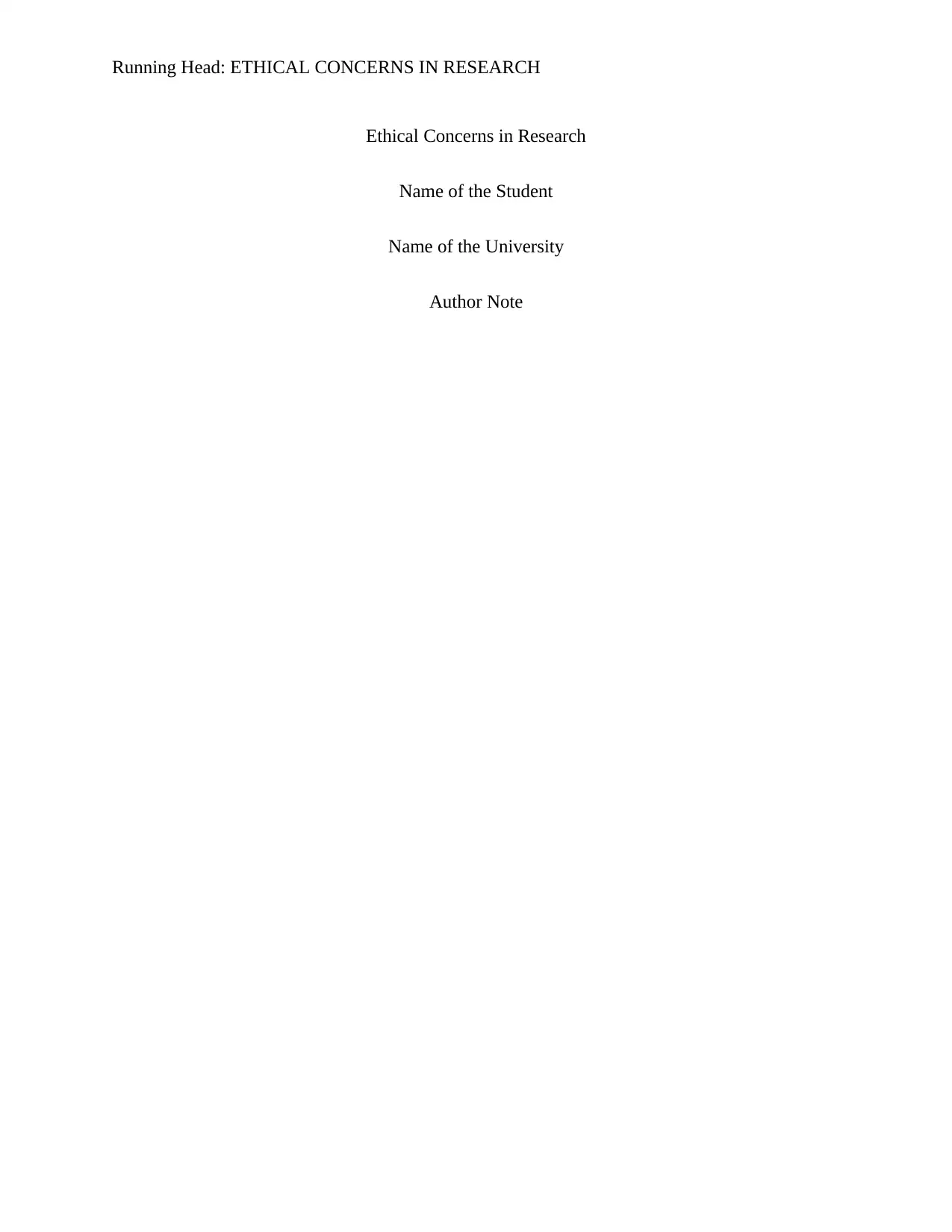
Running Head: ETHICAL CONCERNS IN RESEARCH
Ethical Concerns in Research
Name of the Student
Name of the University
Author Note
Ethical Concerns in Research
Name of the Student
Name of the University
Author Note
Paraphrase This Document
Need a fresh take? Get an instant paraphrase of this document with our AI Paraphraser
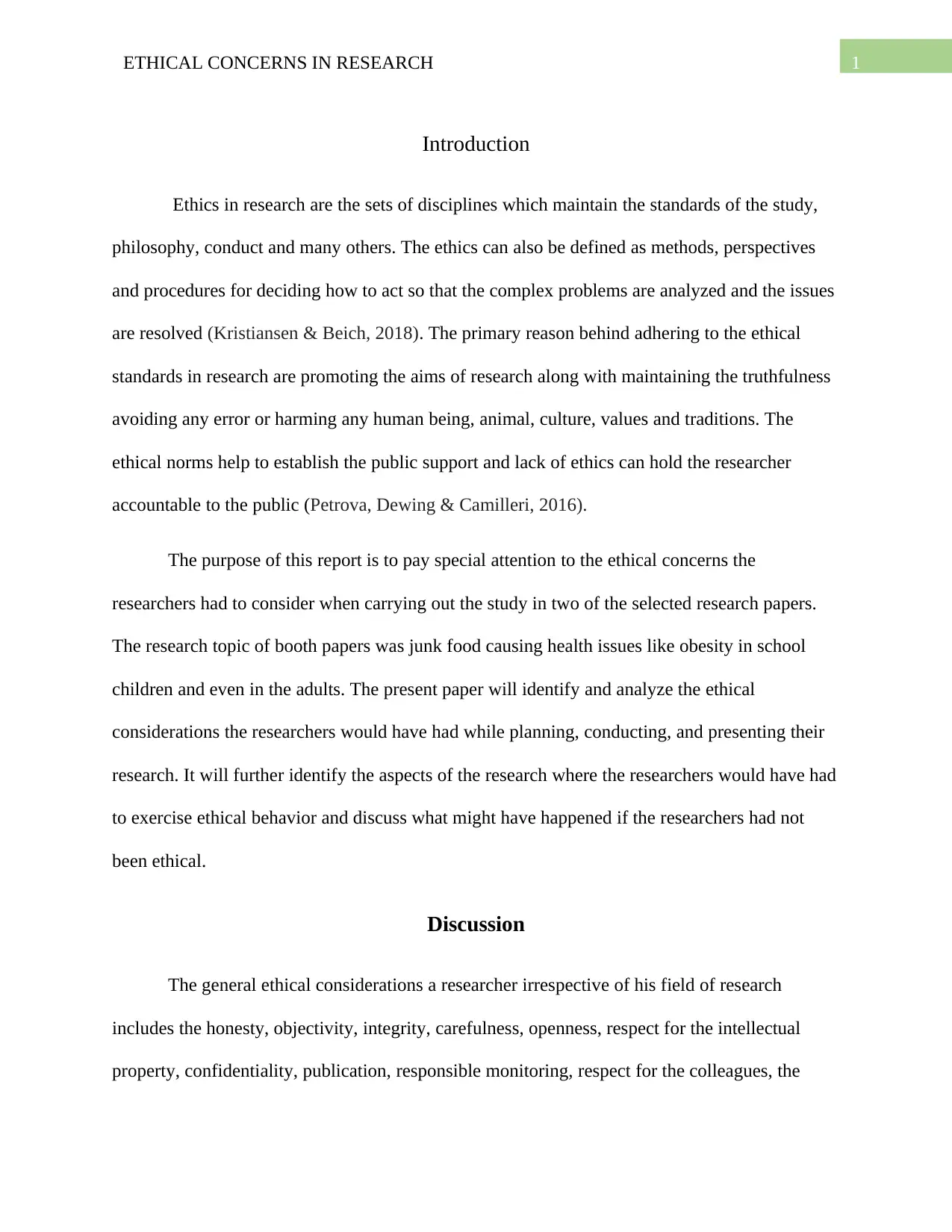
1ETHICAL CONCERNS IN RESEARCH
Introduction
Ethics in research are the sets of disciplines which maintain the standards of the study,
philosophy, conduct and many others. The ethics can also be defined as methods, perspectives
and procedures for deciding how to act so that the complex problems are analyzed and the issues
are resolved (Kristiansen & Beich, 2018). The primary reason behind adhering to the ethical
standards in research are promoting the aims of research along with maintaining the truthfulness
avoiding any error or harming any human being, animal, culture, values and traditions. The
ethical norms help to establish the public support and lack of ethics can hold the researcher
accountable to the public (Petrova, Dewing & Camilleri, 2016).
The purpose of this report is to pay special attention to the ethical concerns the
researchers had to consider when carrying out the study in two of the selected research papers.
The research topic of booth papers was junk food causing health issues like obesity in school
children and even in the adults. The present paper will identify and analyze the ethical
considerations the researchers would have had while planning, conducting, and presenting their
research. It will further identify the aspects of the research where the researchers would have had
to exercise ethical behavior and discuss what might have happened if the researchers had not
been ethical.
Discussion
The general ethical considerations a researcher irrespective of his field of research
includes the honesty, objectivity, integrity, carefulness, openness, respect for the intellectual
property, confidentiality, publication, responsible monitoring, respect for the colleagues, the
Introduction
Ethics in research are the sets of disciplines which maintain the standards of the study,
philosophy, conduct and many others. The ethics can also be defined as methods, perspectives
and procedures for deciding how to act so that the complex problems are analyzed and the issues
are resolved (Kristiansen & Beich, 2018). The primary reason behind adhering to the ethical
standards in research are promoting the aims of research along with maintaining the truthfulness
avoiding any error or harming any human being, animal, culture, values and traditions. The
ethical norms help to establish the public support and lack of ethics can hold the researcher
accountable to the public (Petrova, Dewing & Camilleri, 2016).
The purpose of this report is to pay special attention to the ethical concerns the
researchers had to consider when carrying out the study in two of the selected research papers.
The research topic of booth papers was junk food causing health issues like obesity in school
children and even in the adults. The present paper will identify and analyze the ethical
considerations the researchers would have had while planning, conducting, and presenting their
research. It will further identify the aspects of the research where the researchers would have had
to exercise ethical behavior and discuss what might have happened if the researchers had not
been ethical.
Discussion
The general ethical considerations a researcher irrespective of his field of research
includes the honesty, objectivity, integrity, carefulness, openness, respect for the intellectual
property, confidentiality, publication, responsible monitoring, respect for the colleagues, the
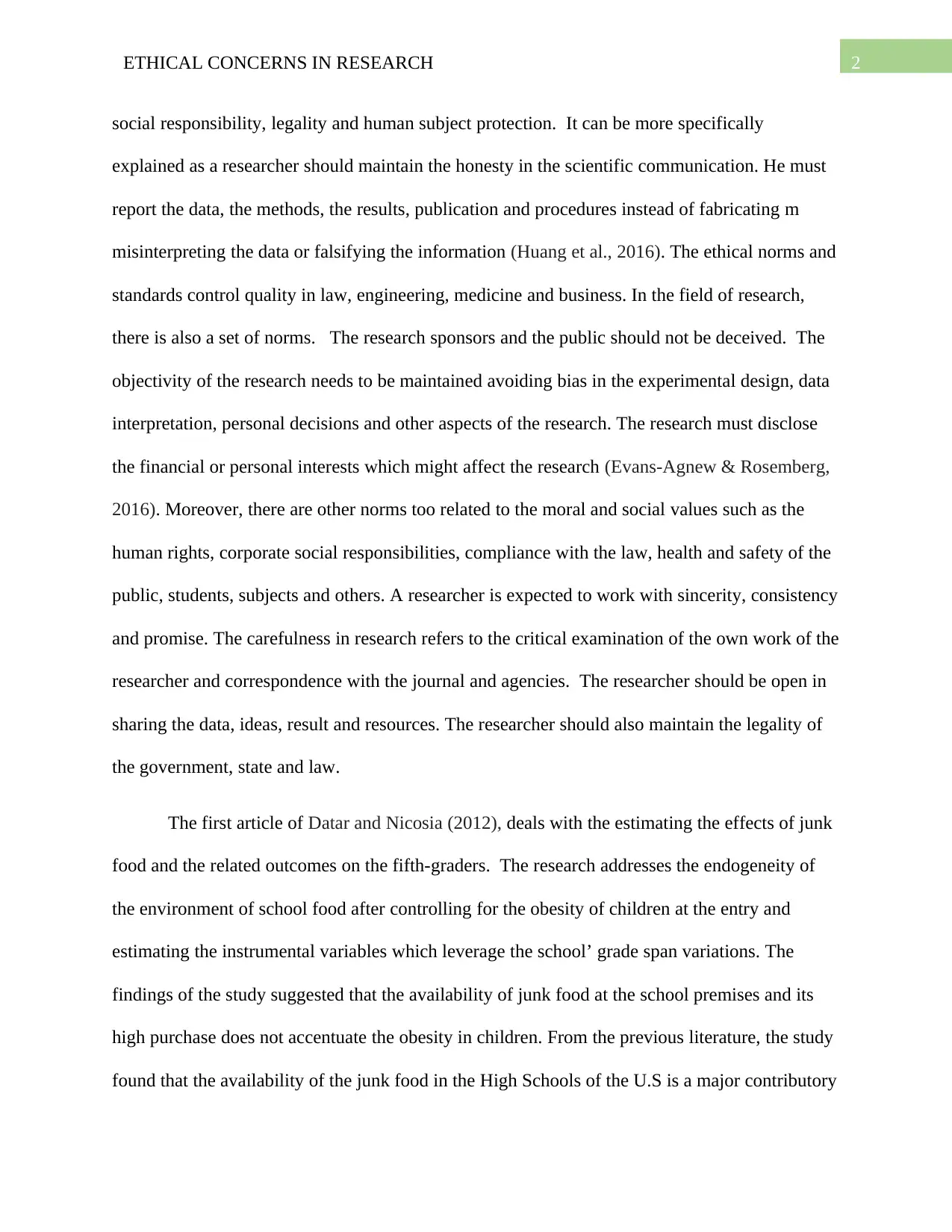
2ETHICAL CONCERNS IN RESEARCH
social responsibility, legality and human subject protection. It can be more specifically
explained as a researcher should maintain the honesty in the scientific communication. He must
report the data, the methods, the results, publication and procedures instead of fabricating m
misinterpreting the data or falsifying the information (Huang et al., 2016). The ethical norms and
standards control quality in law, engineering, medicine and business. In the field of research,
there is also a set of norms. The research sponsors and the public should not be deceived. The
objectivity of the research needs to be maintained avoiding bias in the experimental design, data
interpretation, personal decisions and other aspects of the research. The research must disclose
the financial or personal interests which might affect the research (Evans-Agnew & Rosemberg,
2016). Moreover, there are other norms too related to the moral and social values such as the
human rights, corporate social responsibilities, compliance with the law, health and safety of the
public, students, subjects and others. A researcher is expected to work with sincerity, consistency
and promise. The carefulness in research refers to the critical examination of the own work of the
researcher and correspondence with the journal and agencies. The researcher should be open in
sharing the data, ideas, result and resources. The researcher should also maintain the legality of
the government, state and law.
The first article of Datar and Nicosia (2012), deals with the estimating the effects of junk
food and the related outcomes on the fifth-graders. The research addresses the endogeneity of
the environment of school food after controlling for the obesity of children at the entry and
estimating the instrumental variables which leverage the school’ grade span variations. The
findings of the study suggested that the availability of junk food at the school premises and its
high purchase does not accentuate the obesity in children. From the previous literature, the study
found that the availability of the junk food in the High Schools of the U.S is a major contributory
social responsibility, legality and human subject protection. It can be more specifically
explained as a researcher should maintain the honesty in the scientific communication. He must
report the data, the methods, the results, publication and procedures instead of fabricating m
misinterpreting the data or falsifying the information (Huang et al., 2016). The ethical norms and
standards control quality in law, engineering, medicine and business. In the field of research,
there is also a set of norms. The research sponsors and the public should not be deceived. The
objectivity of the research needs to be maintained avoiding bias in the experimental design, data
interpretation, personal decisions and other aspects of the research. The research must disclose
the financial or personal interests which might affect the research (Evans-Agnew & Rosemberg,
2016). Moreover, there are other norms too related to the moral and social values such as the
human rights, corporate social responsibilities, compliance with the law, health and safety of the
public, students, subjects and others. A researcher is expected to work with sincerity, consistency
and promise. The carefulness in research refers to the critical examination of the own work of the
researcher and correspondence with the journal and agencies. The researcher should be open in
sharing the data, ideas, result and resources. The researcher should also maintain the legality of
the government, state and law.
The first article of Datar and Nicosia (2012), deals with the estimating the effects of junk
food and the related outcomes on the fifth-graders. The research addresses the endogeneity of
the environment of school food after controlling for the obesity of children at the entry and
estimating the instrumental variables which leverage the school’ grade span variations. The
findings of the study suggested that the availability of junk food at the school premises and its
high purchase does not accentuate the obesity in children. From the previous literature, the study
found that the availability of the junk food in the High Schools of the U.S is a major contributory
⊘ This is a preview!⊘
Do you want full access?
Subscribe today to unlock all pages.

Trusted by 1+ million students worldwide
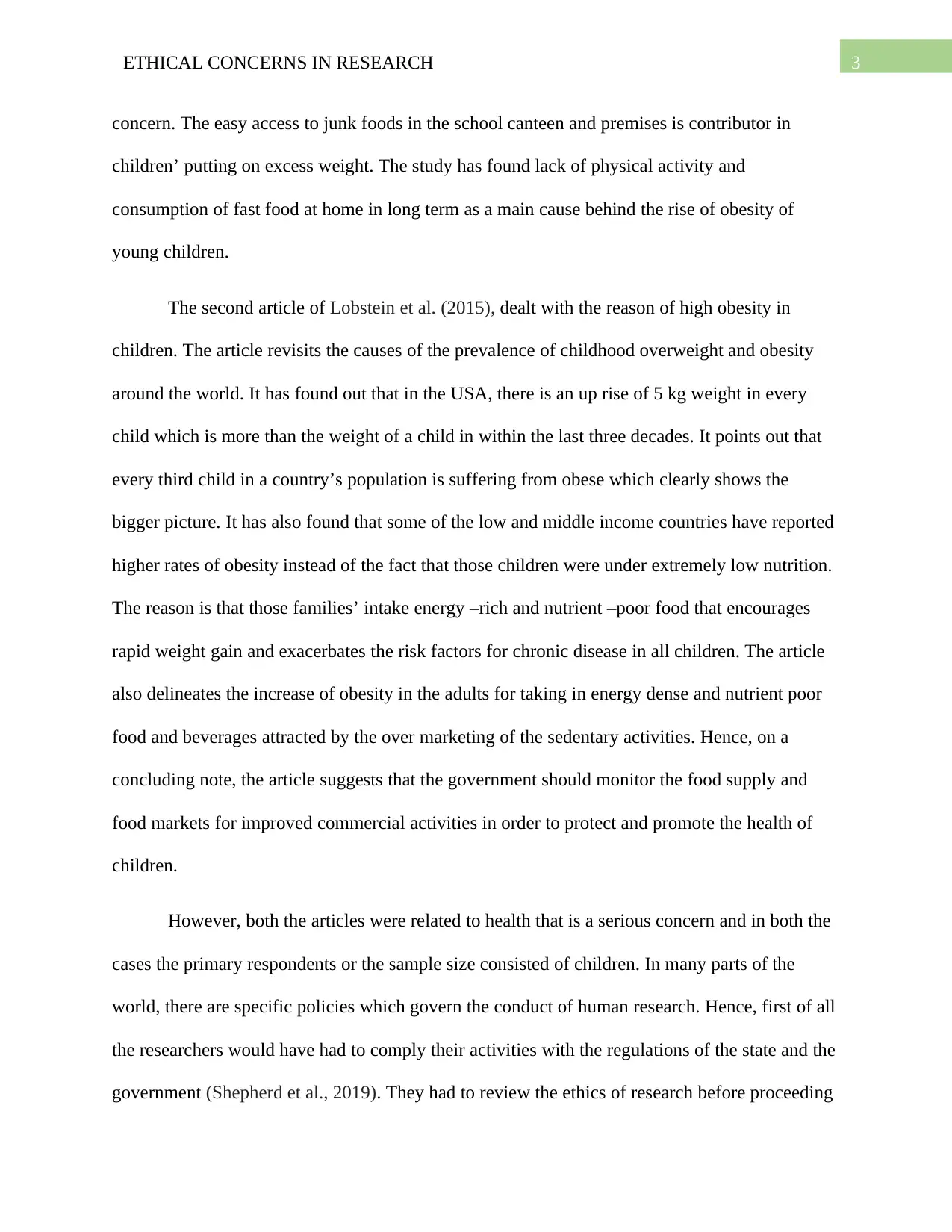
3ETHICAL CONCERNS IN RESEARCH
concern. The easy access to junk foods in the school canteen and premises is contributor in
children’ putting on excess weight. The study has found lack of physical activity and
consumption of fast food at home in long term as a main cause behind the rise of obesity of
young children.
The second article of Lobstein et al. (2015), dealt with the reason of high obesity in
children. The article revisits the causes of the prevalence of childhood overweight and obesity
around the world. It has found out that in the USA, there is an up rise of 5 kg weight in every
child which is more than the weight of a child in within the last three decades. It points out that
every third child in a country’s population is suffering from obese which clearly shows the
bigger picture. It has also found that some of the low and middle income countries have reported
higher rates of obesity instead of the fact that those children were under extremely low nutrition.
The reason is that those families’ intake energy –rich and nutrient –poor food that encourages
rapid weight gain and exacerbates the risk factors for chronic disease in all children. The article
also delineates the increase of obesity in the adults for taking in energy dense and nutrient poor
food and beverages attracted by the over marketing of the sedentary activities. Hence, on a
concluding note, the article suggests that the government should monitor the food supply and
food markets for improved commercial activities in order to protect and promote the health of
children.
However, both the articles were related to health that is a serious concern and in both the
cases the primary respondents or the sample size consisted of children. In many parts of the
world, there are specific policies which govern the conduct of human research. Hence, first of all
the researchers would have had to comply their activities with the regulations of the state and the
government (Shepherd et al., 2019). They had to review the ethics of research before proceeding
concern. The easy access to junk foods in the school canteen and premises is contributor in
children’ putting on excess weight. The study has found lack of physical activity and
consumption of fast food at home in long term as a main cause behind the rise of obesity of
young children.
The second article of Lobstein et al. (2015), dealt with the reason of high obesity in
children. The article revisits the causes of the prevalence of childhood overweight and obesity
around the world. It has found out that in the USA, there is an up rise of 5 kg weight in every
child which is more than the weight of a child in within the last three decades. It points out that
every third child in a country’s population is suffering from obese which clearly shows the
bigger picture. It has also found that some of the low and middle income countries have reported
higher rates of obesity instead of the fact that those children were under extremely low nutrition.
The reason is that those families’ intake energy –rich and nutrient –poor food that encourages
rapid weight gain and exacerbates the risk factors for chronic disease in all children. The article
also delineates the increase of obesity in the adults for taking in energy dense and nutrient poor
food and beverages attracted by the over marketing of the sedentary activities. Hence, on a
concluding note, the article suggests that the government should monitor the food supply and
food markets for improved commercial activities in order to protect and promote the health of
children.
However, both the articles were related to health that is a serious concern and in both the
cases the primary respondents or the sample size consisted of children. In many parts of the
world, there are specific policies which govern the conduct of human research. Hence, first of all
the researchers would have had to comply their activities with the regulations of the state and the
government (Shepherd et al., 2019). They had to review the ethics of research before proceeding
Paraphrase This Document
Need a fresh take? Get an instant paraphrase of this document with our AI Paraphraser
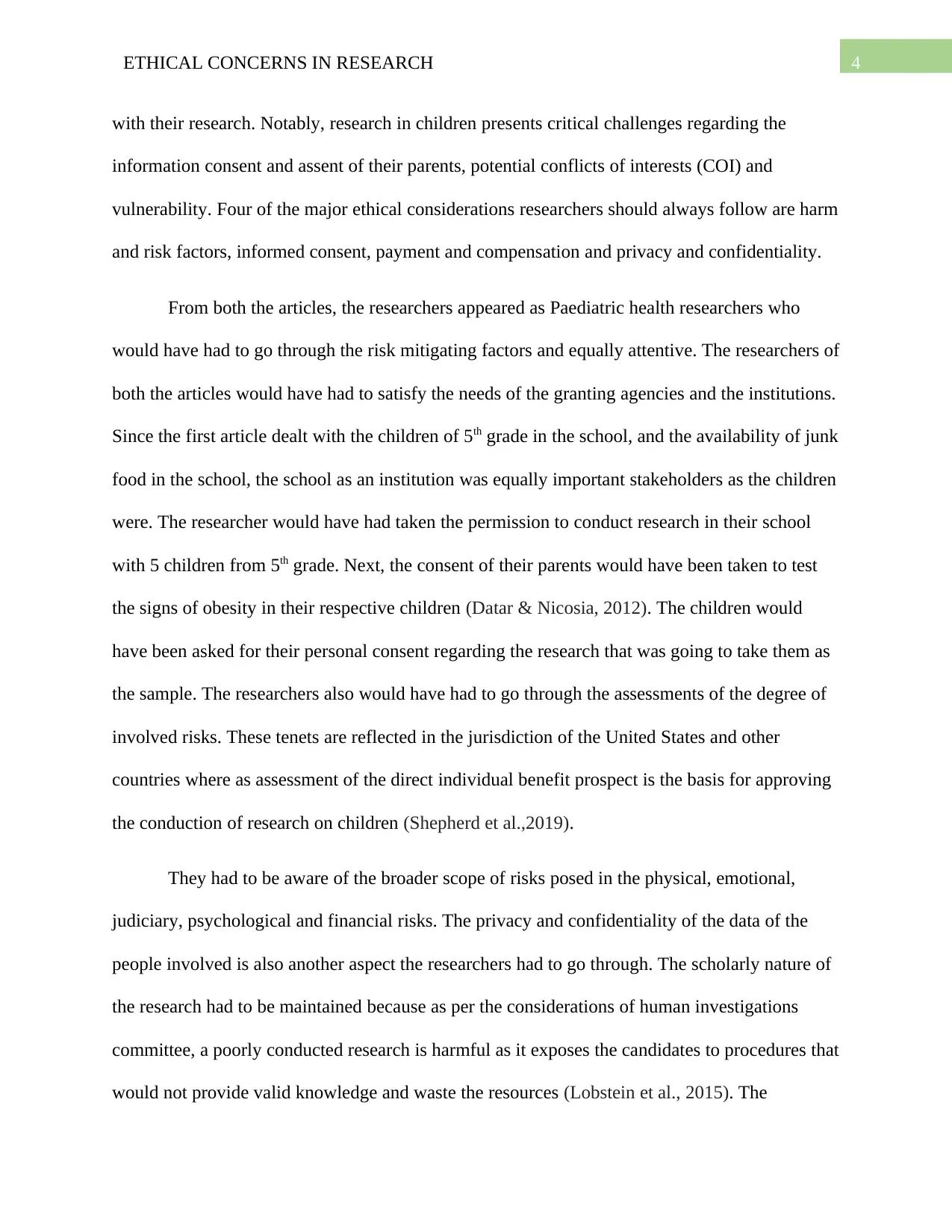
4ETHICAL CONCERNS IN RESEARCH
with their research. Notably, research in children presents critical challenges regarding the
information consent and assent of their parents, potential conflicts of interests (COI) and
vulnerability. Four of the major ethical considerations researchers should always follow are harm
and risk factors, informed consent, payment and compensation and privacy and confidentiality.
From both the articles, the researchers appeared as Paediatric health researchers who
would have had to go through the risk mitigating factors and equally attentive. The researchers of
both the articles would have had to satisfy the needs of the granting agencies and the institutions.
Since the first article dealt with the children of 5th grade in the school, and the availability of junk
food in the school, the school as an institution was equally important stakeholders as the children
were. The researcher would have had taken the permission to conduct research in their school
with 5 children from 5th grade. Next, the consent of their parents would have been taken to test
the signs of obesity in their respective children (Datar & Nicosia, 2012). The children would
have been asked for their personal consent regarding the research that was going to take them as
the sample. The researchers also would have had to go through the assessments of the degree of
involved risks. These tenets are reflected in the jurisdiction of the United States and other
countries where as assessment of the direct individual benefit prospect is the basis for approving
the conduction of research on children (Shepherd et al.,2019).
They had to be aware of the broader scope of risks posed in the physical, emotional,
judiciary, psychological and financial risks. The privacy and confidentiality of the data of the
people involved is also another aspect the researchers had to go through. The scholarly nature of
the research had to be maintained because as per the considerations of human investigations
committee, a poorly conducted research is harmful as it exposes the candidates to procedures that
would not provide valid knowledge and waste the resources (Lobstein et al., 2015). The
with their research. Notably, research in children presents critical challenges regarding the
information consent and assent of their parents, potential conflicts of interests (COI) and
vulnerability. Four of the major ethical considerations researchers should always follow are harm
and risk factors, informed consent, payment and compensation and privacy and confidentiality.
From both the articles, the researchers appeared as Paediatric health researchers who
would have had to go through the risk mitigating factors and equally attentive. The researchers of
both the articles would have had to satisfy the needs of the granting agencies and the institutions.
Since the first article dealt with the children of 5th grade in the school, and the availability of junk
food in the school, the school as an institution was equally important stakeholders as the children
were. The researcher would have had taken the permission to conduct research in their school
with 5 children from 5th grade. Next, the consent of their parents would have been taken to test
the signs of obesity in their respective children (Datar & Nicosia, 2012). The children would
have been asked for their personal consent regarding the research that was going to take them as
the sample. The researchers also would have had to go through the assessments of the degree of
involved risks. These tenets are reflected in the jurisdiction of the United States and other
countries where as assessment of the direct individual benefit prospect is the basis for approving
the conduction of research on children (Shepherd et al.,2019).
They had to be aware of the broader scope of risks posed in the physical, emotional,
judiciary, psychological and financial risks. The privacy and confidentiality of the data of the
people involved is also another aspect the researchers had to go through. The scholarly nature of
the research had to be maintained because as per the considerations of human investigations
committee, a poorly conducted research is harmful as it exposes the candidates to procedures that
would not provide valid knowledge and waste the resources (Lobstein et al., 2015). The
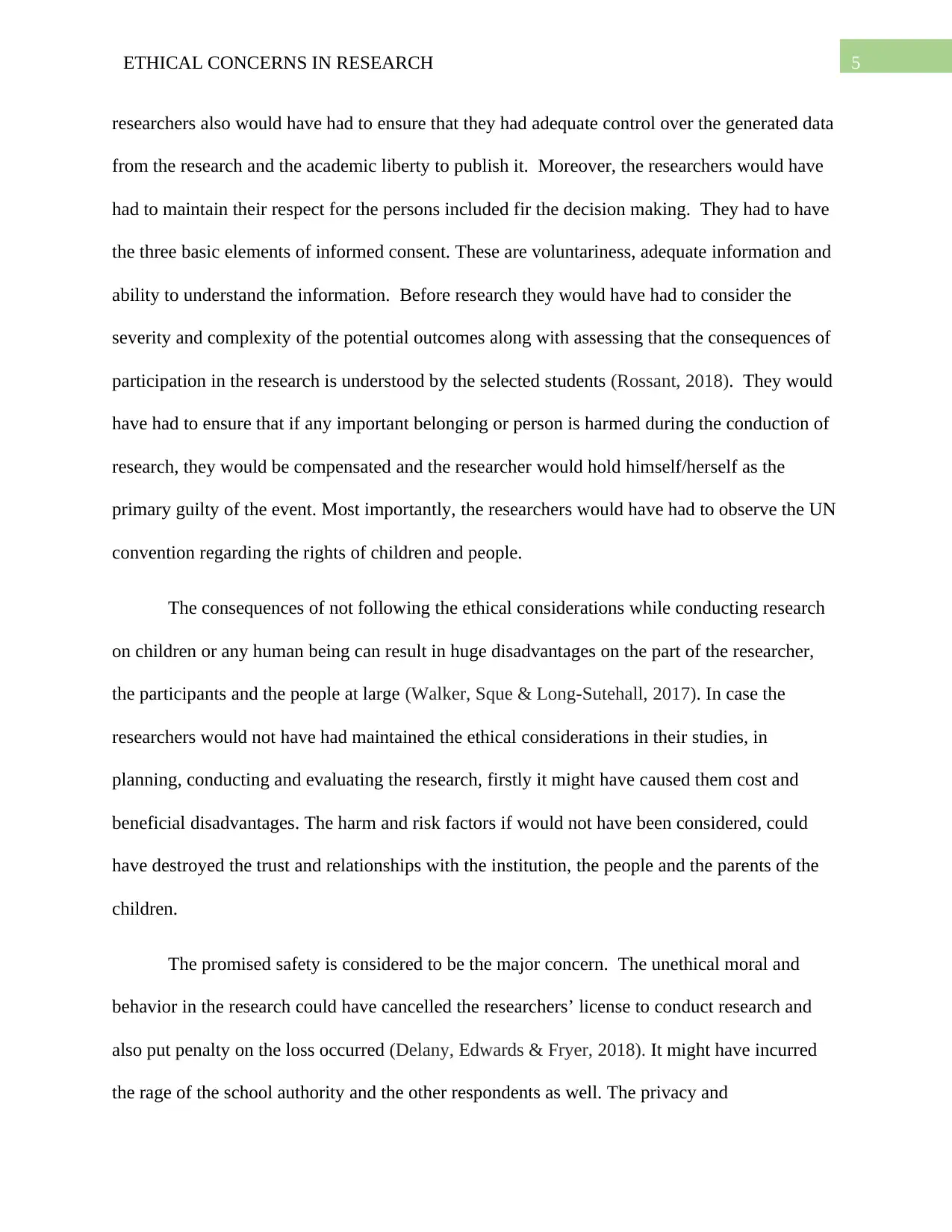
5ETHICAL CONCERNS IN RESEARCH
researchers also would have had to ensure that they had adequate control over the generated data
from the research and the academic liberty to publish it. Moreover, the researchers would have
had to maintain their respect for the persons included fir the decision making. They had to have
the three basic elements of informed consent. These are voluntariness, adequate information and
ability to understand the information. Before research they would have had to consider the
severity and complexity of the potential outcomes along with assessing that the consequences of
participation in the research is understood by the selected students (Rossant, 2018). They would
have had to ensure that if any important belonging or person is harmed during the conduction of
research, they would be compensated and the researcher would hold himself/herself as the
primary guilty of the event. Most importantly, the researchers would have had to observe the UN
convention regarding the rights of children and people.
The consequences of not following the ethical considerations while conducting research
on children or any human being can result in huge disadvantages on the part of the researcher,
the participants and the people at large (Walker, Sque & Long-Sutehall, 2017). In case the
researchers would not have had maintained the ethical considerations in their studies, in
planning, conducting and evaluating the research, firstly it might have caused them cost and
beneficial disadvantages. The harm and risk factors if would not have been considered, could
have destroyed the trust and relationships with the institution, the people and the parents of the
children.
The promised safety is considered to be the major concern. The unethical moral and
behavior in the research could have cancelled the researchers’ license to conduct research and
also put penalty on the loss occurred (Delany, Edwards & Fryer, 2018). It might have incurred
the rage of the school authority and the other respondents as well. The privacy and
researchers also would have had to ensure that they had adequate control over the generated data
from the research and the academic liberty to publish it. Moreover, the researchers would have
had to maintain their respect for the persons included fir the decision making. They had to have
the three basic elements of informed consent. These are voluntariness, adequate information and
ability to understand the information. Before research they would have had to consider the
severity and complexity of the potential outcomes along with assessing that the consequences of
participation in the research is understood by the selected students (Rossant, 2018). They would
have had to ensure that if any important belonging or person is harmed during the conduction of
research, they would be compensated and the researcher would hold himself/herself as the
primary guilty of the event. Most importantly, the researchers would have had to observe the UN
convention regarding the rights of children and people.
The consequences of not following the ethical considerations while conducting research
on children or any human being can result in huge disadvantages on the part of the researcher,
the participants and the people at large (Walker, Sque & Long-Sutehall, 2017). In case the
researchers would not have had maintained the ethical considerations in their studies, in
planning, conducting and evaluating the research, firstly it might have caused them cost and
beneficial disadvantages. The harm and risk factors if would not have been considered, could
have destroyed the trust and relationships with the institution, the people and the parents of the
children.
The promised safety is considered to be the major concern. The unethical moral and
behavior in the research could have cancelled the researchers’ license to conduct research and
also put penalty on the loss occurred (Delany, Edwards & Fryer, 2018). It might have incurred
the rage of the school authority and the other respondents as well. The privacy and
⊘ This is a preview!⊘
Do you want full access?
Subscribe today to unlock all pages.

Trusted by 1+ million students worldwide
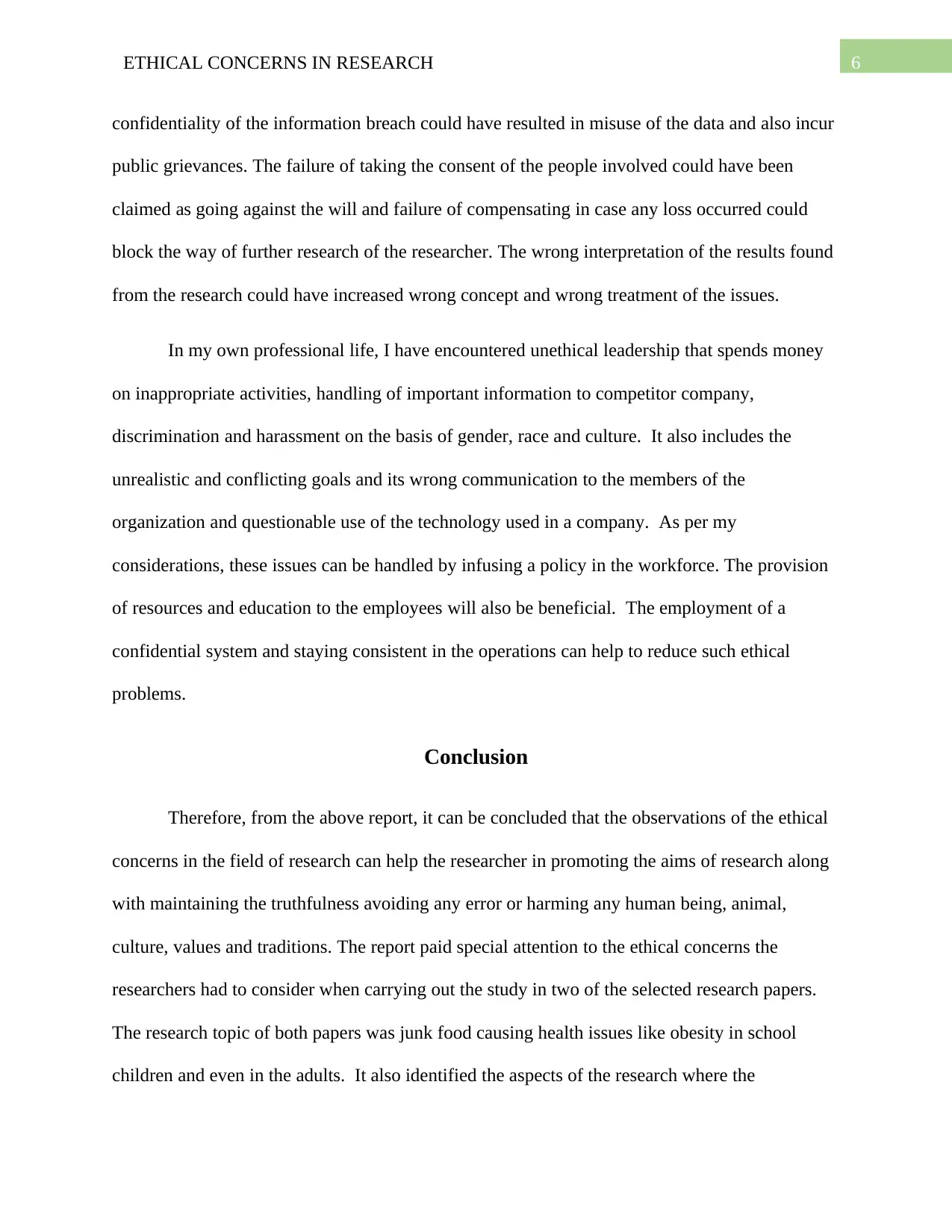
6ETHICAL CONCERNS IN RESEARCH
confidentiality of the information breach could have resulted in misuse of the data and also incur
public grievances. The failure of taking the consent of the people involved could have been
claimed as going against the will and failure of compensating in case any loss occurred could
block the way of further research of the researcher. The wrong interpretation of the results found
from the research could have increased wrong concept and wrong treatment of the issues.
In my own professional life, I have encountered unethical leadership that spends money
on inappropriate activities, handling of important information to competitor company,
discrimination and harassment on the basis of gender, race and culture. It also includes the
unrealistic and conflicting goals and its wrong communication to the members of the
organization and questionable use of the technology used in a company. As per my
considerations, these issues can be handled by infusing a policy in the workforce. The provision
of resources and education to the employees will also be beneficial. The employment of a
confidential system and staying consistent in the operations can help to reduce such ethical
problems.
Conclusion
Therefore, from the above report, it can be concluded that the observations of the ethical
concerns in the field of research can help the researcher in promoting the aims of research along
with maintaining the truthfulness avoiding any error or harming any human being, animal,
culture, values and traditions. The report paid special attention to the ethical concerns the
researchers had to consider when carrying out the study in two of the selected research papers.
The research topic of both papers was junk food causing health issues like obesity in school
children and even in the adults. It also identified the aspects of the research where the
confidentiality of the information breach could have resulted in misuse of the data and also incur
public grievances. The failure of taking the consent of the people involved could have been
claimed as going against the will and failure of compensating in case any loss occurred could
block the way of further research of the researcher. The wrong interpretation of the results found
from the research could have increased wrong concept and wrong treatment of the issues.
In my own professional life, I have encountered unethical leadership that spends money
on inappropriate activities, handling of important information to competitor company,
discrimination and harassment on the basis of gender, race and culture. It also includes the
unrealistic and conflicting goals and its wrong communication to the members of the
organization and questionable use of the technology used in a company. As per my
considerations, these issues can be handled by infusing a policy in the workforce. The provision
of resources and education to the employees will also be beneficial. The employment of a
confidential system and staying consistent in the operations can help to reduce such ethical
problems.
Conclusion
Therefore, from the above report, it can be concluded that the observations of the ethical
concerns in the field of research can help the researcher in promoting the aims of research along
with maintaining the truthfulness avoiding any error or harming any human being, animal,
culture, values and traditions. The report paid special attention to the ethical concerns the
researchers had to consider when carrying out the study in two of the selected research papers.
The research topic of both papers was junk food causing health issues like obesity in school
children and even in the adults. It also identified the aspects of the research where the
Paraphrase This Document
Need a fresh take? Get an instant paraphrase of this document with our AI Paraphraser
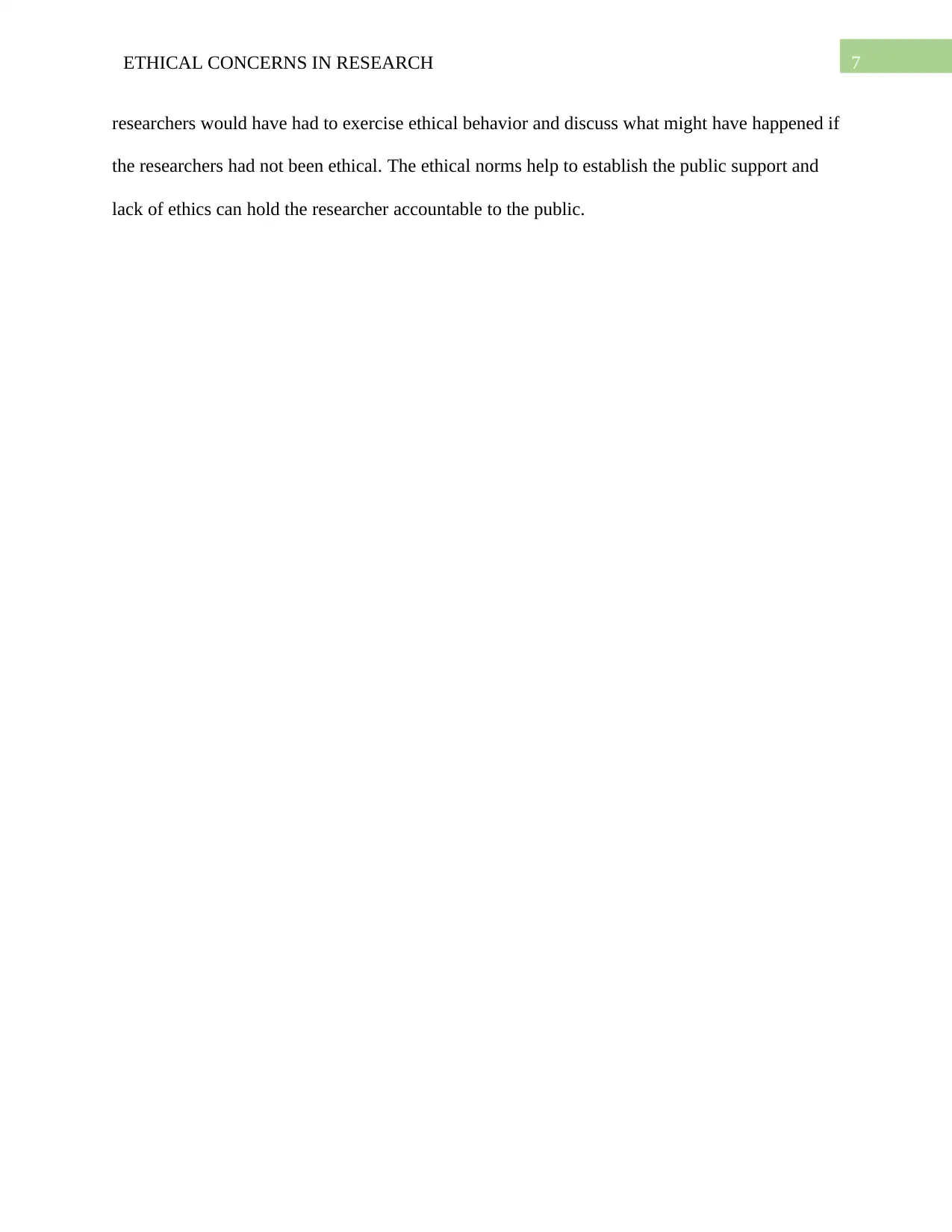
7ETHICAL CONCERNS IN RESEARCH
researchers would have had to exercise ethical behavior and discuss what might have happened if
the researchers had not been ethical. The ethical norms help to establish the public support and
lack of ethics can hold the researcher accountable to the public.
researchers would have had to exercise ethical behavior and discuss what might have happened if
the researchers had not been ethical. The ethical norms help to establish the public support and
lack of ethics can hold the researcher accountable to the public.
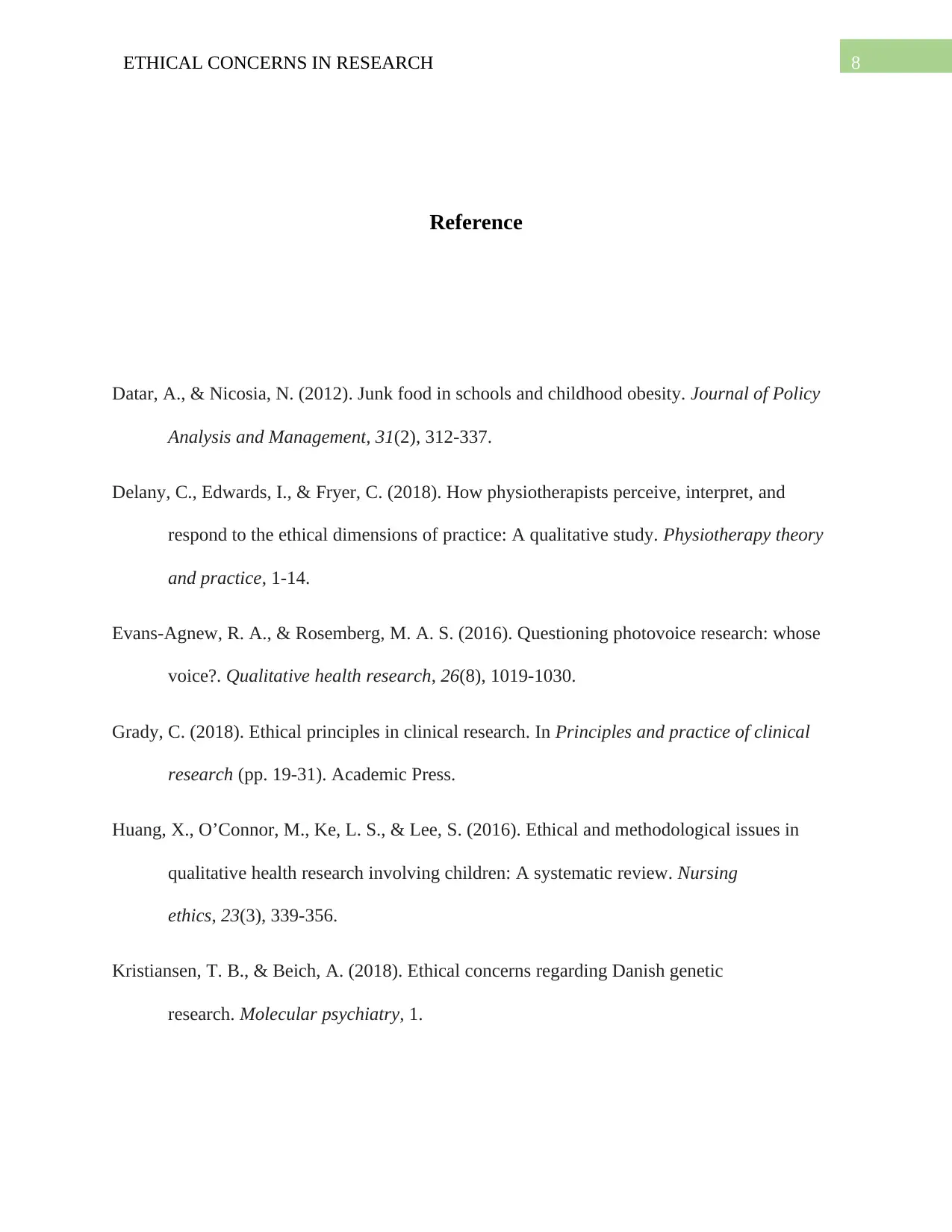
8ETHICAL CONCERNS IN RESEARCH
Reference
Datar, A., & Nicosia, N. (2012). Junk food in schools and childhood obesity. Journal of Policy
Analysis and Management, 31(2), 312-337.
Delany, C., Edwards, I., & Fryer, C. (2018). How physiotherapists perceive, interpret, and
respond to the ethical dimensions of practice: A qualitative study. Physiotherapy theory
and practice, 1-14.
Evans-Agnew, R. A., & Rosemberg, M. A. S. (2016). Questioning photovoice research: whose
voice?. Qualitative health research, 26(8), 1019-1030.
Grady, C. (2018). Ethical principles in clinical research. In Principles and practice of clinical
research (pp. 19-31). Academic Press.
Huang, X., O’Connor, M., Ke, L. S., & Lee, S. (2016). Ethical and methodological issues in
qualitative health research involving children: A systematic review. Nursing
ethics, 23(3), 339-356.
Kristiansen, T. B., & Beich, A. (2018). Ethical concerns regarding Danish genetic
research. Molecular psychiatry, 1.
Reference
Datar, A., & Nicosia, N. (2012). Junk food in schools and childhood obesity. Journal of Policy
Analysis and Management, 31(2), 312-337.
Delany, C., Edwards, I., & Fryer, C. (2018). How physiotherapists perceive, interpret, and
respond to the ethical dimensions of practice: A qualitative study. Physiotherapy theory
and practice, 1-14.
Evans-Agnew, R. A., & Rosemberg, M. A. S. (2016). Questioning photovoice research: whose
voice?. Qualitative health research, 26(8), 1019-1030.
Grady, C. (2018). Ethical principles in clinical research. In Principles and practice of clinical
research (pp. 19-31). Academic Press.
Huang, X., O’Connor, M., Ke, L. S., & Lee, S. (2016). Ethical and methodological issues in
qualitative health research involving children: A systematic review. Nursing
ethics, 23(3), 339-356.
Kristiansen, T. B., & Beich, A. (2018). Ethical concerns regarding Danish genetic
research. Molecular psychiatry, 1.
⊘ This is a preview!⊘
Do you want full access?
Subscribe today to unlock all pages.

Trusted by 1+ million students worldwide
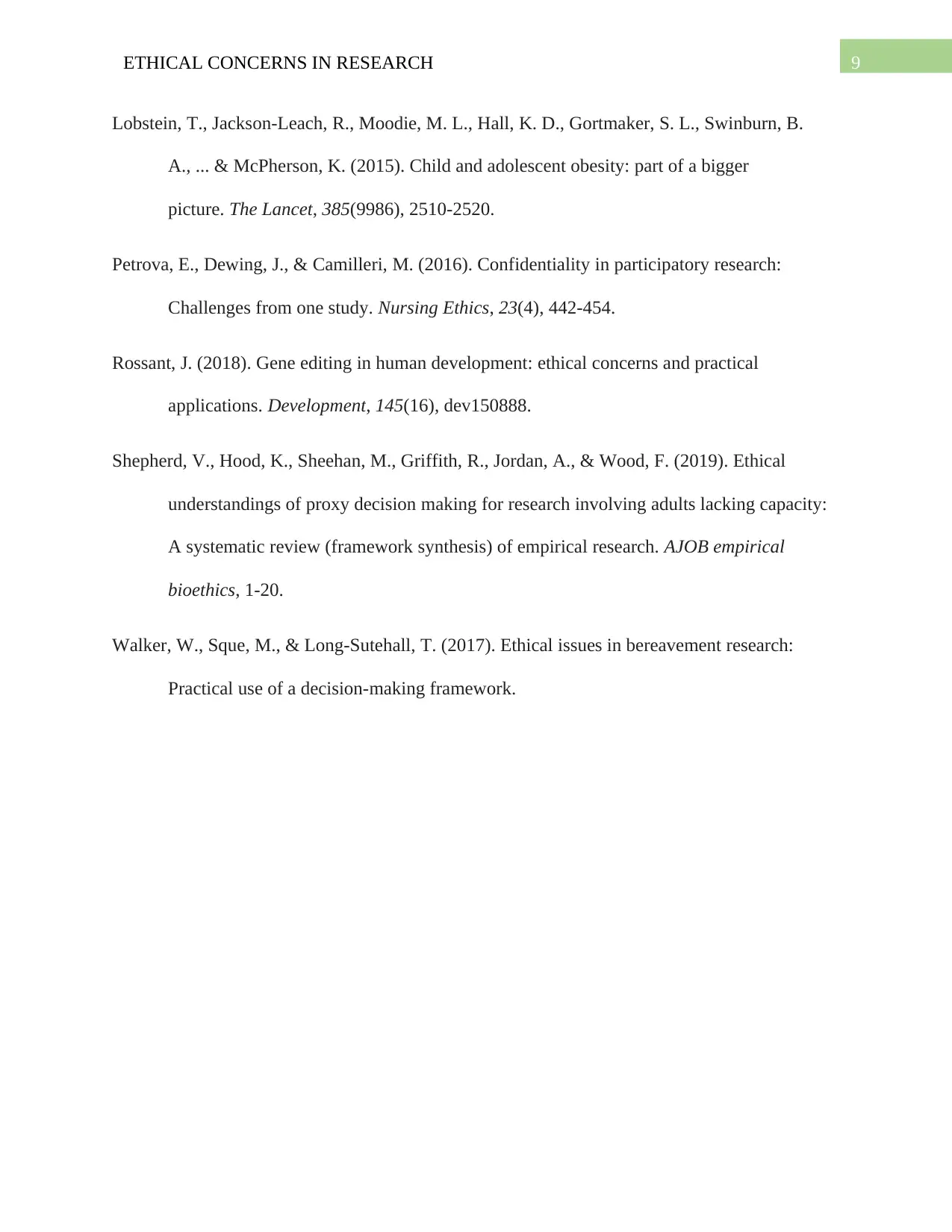
9ETHICAL CONCERNS IN RESEARCH
Lobstein, T., Jackson-Leach, R., Moodie, M. L., Hall, K. D., Gortmaker, S. L., Swinburn, B.
A., ... & McPherson, K. (2015). Child and adolescent obesity: part of a bigger
picture. The Lancet, 385(9986), 2510-2520.
Petrova, E., Dewing, J., & Camilleri, M. (2016). Confidentiality in participatory research:
Challenges from one study. Nursing Ethics, 23(4), 442-454.
Rossant, J. (2018). Gene editing in human development: ethical concerns and practical
applications. Development, 145(16), dev150888.
Shepherd, V., Hood, K., Sheehan, M., Griffith, R., Jordan, A., & Wood, F. (2019). Ethical
understandings of proxy decision making for research involving adults lacking capacity:
A systematic review (framework synthesis) of empirical research. AJOB empirical
bioethics, 1-20.
Walker, W., Sque, M., & Long-Sutehall, T. (2017). Ethical issues in bereavement research:
Practical use of a decision-making framework.
Lobstein, T., Jackson-Leach, R., Moodie, M. L., Hall, K. D., Gortmaker, S. L., Swinburn, B.
A., ... & McPherson, K. (2015). Child and adolescent obesity: part of a bigger
picture. The Lancet, 385(9986), 2510-2520.
Petrova, E., Dewing, J., & Camilleri, M. (2016). Confidentiality in participatory research:
Challenges from one study. Nursing Ethics, 23(4), 442-454.
Rossant, J. (2018). Gene editing in human development: ethical concerns and practical
applications. Development, 145(16), dev150888.
Shepherd, V., Hood, K., Sheehan, M., Griffith, R., Jordan, A., & Wood, F. (2019). Ethical
understandings of proxy decision making for research involving adults lacking capacity:
A systematic review (framework synthesis) of empirical research. AJOB empirical
bioethics, 1-20.
Walker, W., Sque, M., & Long-Sutehall, T. (2017). Ethical issues in bereavement research:
Practical use of a decision-making framework.
1 out of 10
Related Documents
Your All-in-One AI-Powered Toolkit for Academic Success.
+13062052269
info@desklib.com
Available 24*7 on WhatsApp / Email
![[object Object]](/_next/static/media/star-bottom.7253800d.svg)
Unlock your academic potential
Copyright © 2020–2026 A2Z Services. All Rights Reserved. Developed and managed by ZUCOL.





